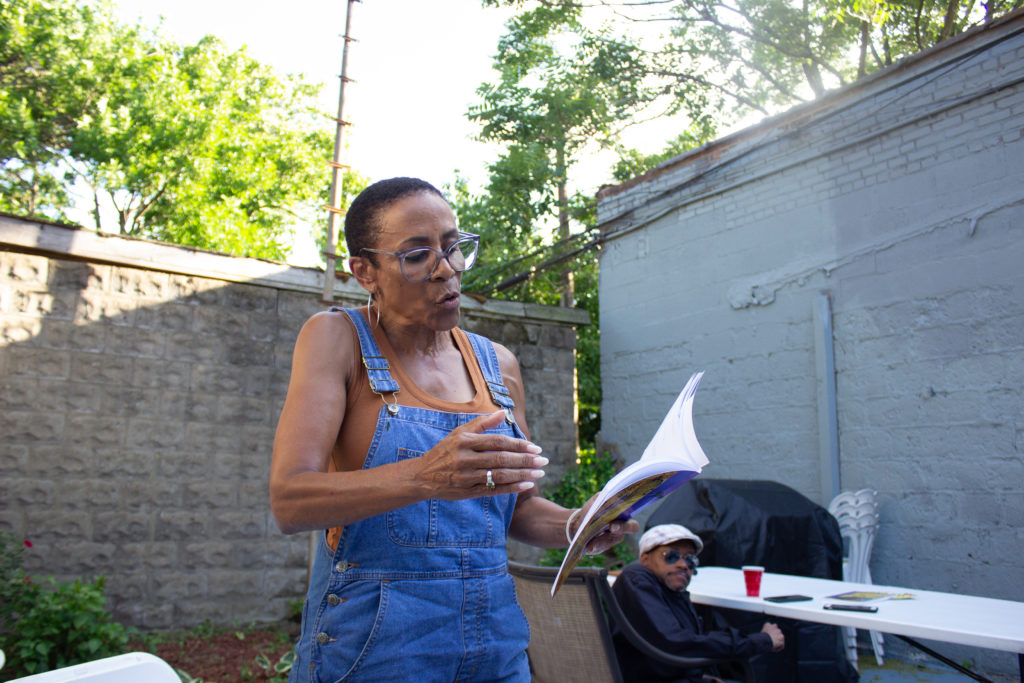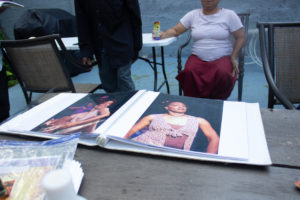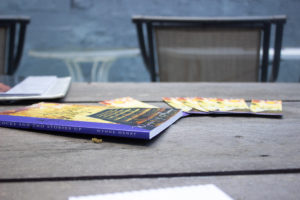Wynne Henry always had dreams of moving back to Brooklyn.
The Flatbush-bred poet and writer would often talk about it on the phone with her friend Helene Ruiz, founder of the Urban Individualists Collective. They would daydream about moving into adjacent apartment buildings so that they could send food over to each other over the clothewsire and laugh at all the chicken heads below them.
Unfortunately, Henry, who friends often called “poetry dancer,” never got to live that dream. She died in December of last year in California, after a battle with cancer. But her friends ended up giving her the next best thing with a proper memorial in her hometown.
On Friday, several of Henry’s friends gathered in the backyard of an AirBnb in Little Haiti to give the Brooklyn girl a deserving send-off. Throughout her life, Henry worked as a creative writing teacher both in New York City and on the west coast, where she moved several years ago to take care of her mother. Several small plastic fold up tables were set up in the back, each decorated with old photos of Henry and copies of her poetry collection “7 Blocks… and TWO Stories up” that friends would read from.
“She was quiet, simple, practical, and made every effort to do what was good for herself and those around her. She was a woman of her word, and I felt she deserved so much more than life gave her in return,” Kimberly Allen, 54, said. They had been friends for 12 years, originally meeting in the Los Angeles poetry scene.
In everyday life, Wynne was a quiet and introspective person. She wasn’t necessarily shy, but was reserved and often didn’t want to worry friends with her own problems. But in her writing, her voice soared.
“She seemed to really see people. When she brought her poetry and some of the things that she expressed, it let you know that she paid attention to everyday life and the people that she would run across,” Allen continued.
Henry’s poems delved into an array of topics: the scourge of racism, the simple pleasure and disappointments of love and meditations on daily life. One poem, which started as a writing prompt asking poets to define why they write, demonstrates some of her artistic drive.
“I want my poetry to help you find your voice/one word at a time/and when you finally run out of things to say/I want my poetry to speak for you,” a poem entitled ‘I want my poetry to’ reads, from her collection “7 Blocks… and TWO Stories up.”
And on Friday afternoon, Henry’s words spoke for the friend who months later still struggled to find the words to properly mourn her.
Karen Abercrombie remembers many things about her friend of over 20 years, but one of the first that came to mind was her love of cats. After all, Henry is the reason why Abercrombie has two herself.
One Thanksgiving in North Carolina, Abercrombie took Henry to the local animal shelter. They came back each day just to look at one specific cat to adopt. He ended up getting adopted by another family. So, naturally, Abercrombie ended up adopting two other cats instead: one name Langston, after Langston Hughes (one of Henry’s favorite writers); and the other Finn.
Henry didn’t own a cat herself, Abercrombie explained, and speculated that it was because of the disappearance of her childhood cat. But that didn’t stop her from showering her friends’ pets with homemade crochets or picking up their favorite food when she saw it in a supermarket.
“Everytime I look at my cats – or things we shared together, like our love for African fabrics – I think of her,” Abercrombie said tearfully.
William Washington, a fellow poet, said that Henry had shaped him in many ways.
“So what I remember most about her is that besides great poetry, was the love affair we had that was never a love affair,” Washington said explaining their complicated relationship. Washington explained that while they had deep feelings for each other, Henry often kept him at arms length after her first battle with breast cancer.
“I loved her. And I like to think she loved me,” Washington said, to audible agreements from other memorial attendees.
Washington described his poetry before meeting Henry as mad and angry, which often contained harsh language. But Henry taught him that he could use his words to talk about more than just what enraged him.
“You wasn’t born angry like this. So don’t be afraid to write about love. And even if I was writing about my broken heart, she said write about this therapy. She taught me how to use soothing calming words instead of the words I was using,” Washington said.
While most of the attendants knew Henry in different ways, either in passing through art and poetry shows or decades long friendships, Luis Hidalgo, who never met Henry and attended the memorial with his wife,was equally moved by the ceremony.
“You know, as I get older, I think about my legacy. And to see what a legacy this woman left, the way she touched you. And the way she touched me through the words that you spoke here. What a wonderful thing,” Hidalgo said. “You know, words that were written down 2,000, 3,000 years ago, hundreds of years ago, that still echo today. Words that have taken men into battle. Words, putting men and women in love. And we still read it all these years later. And somehow this lady fits that mold.
Hidalgo continued to say that in reality Henry isn’t gone.
“Because in the Bible, it says if more than two to speak my word, I am present. Well, she’s present then.”





